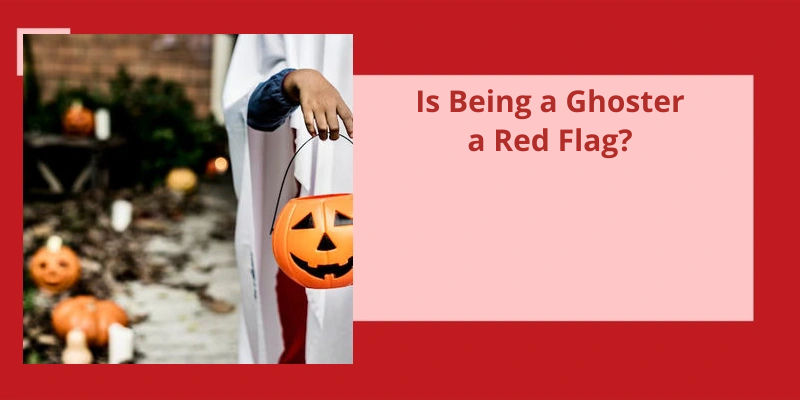Is being a ghoster a red flag? Ghosting, the act of suddenly cutting off all communication with someone without explanation or warning, has become increasingly prevalent in today's digital age. It’s a phenomenon that’s left many individuals feeling hurt, confused, and questioning their self-worth. Ghosting is, without a doubt, a signal of a weak or strained connection. It signifies a disconnect between individuals, whether it be in a romantic relationship, friendship, or even a professional setting. The act of ghosting is a big red flag that we might be losing someone we love or someone we wanted to love. It raises questions about the other person's intentions, sincerity, and emotional maturity. If someone ghosts you, they’re either playing a mind game, avoiding confrontation, or simply displaying a lack of care and empathy towards you. It’s a hurtful experience that leaves the ghosted party feeling abandoned, rejected, and questioning their own worthiness of love and affection. Absolutely. It’s a clear indication that the person engaging in this behavior lacks the emotional intelligence, communication skills, and respect needed for a healthy relationship. Furthermore, it highlights a disregard for the feelings and emotions of others, which is essential for building and maintaining meaningful connections. Ghosting reveals a person's inability or unwillingness to confront uncomfortable situations or have open and honest conversations about their feelings. It shows a lack of accountability and empathy, which are vital components of any mature and fulfilling relationship. It’s a behavior that raises serious doubts about a person's character, reliability, and readiness for a genuine and committed relationship.
Is Ghosting a Trauma Response?
Is ghosting a trauma response? This question raises an interesting perspective on the phenomenon of ghosting. Ghosting occurs when one person abruptly ends all communication with another without explanation or closure. The person being ghosted is often left feeling confused, hurt, and rejected.
Psychologists suggest that ghosting can be seen as a defense mechanism or a way to avoid emotional discomfort. When someone feels overwhelmed by a situation or finds it challenging to confront their feelings directly, they may resort to ghosting as a coping mechanism. By cutting off communication abruptly, they can create a sense of distance and protect themselves from potential emotional pain.
It could be linked to experiences of abandonment, rejection, or emotional neglect in childhood, or even traumatic events in adult life.
While it’s important to understand the potential reasons behind ghosting, it’s crucial to recognize that it still has consequences for the person being ghosted. Being on the receiving end of ghosting can be deeply hurtful and damaging to ones self-esteem. It can leave the person questioning what they did wrong, feeling inadequate, and struggling to trust others in future relationships.
It highlights that unresolved trauma and emotional avoidance may play a role in this behavior.
Is ghosting a form of control? While some may view ghosting as an indication of emotional immaturity or fear of intimacy, it’s important to recognize that this behavior can also be employed by abusers and manipulators with narcissistic tendencies. These individuals often employ ghosting as a means to exert power and control over their victims.
Is Ghosting a Form of Control?
Is being a ghoster a red flag? It’s a question that arises when exploring the motivations behind ghosting as a form of control. While some may view ghosting as a sign of emotional immaturity or fear of intimacy, it’s crucial to recognize that ghosting can also be a tactic employed by abusers and manipulators. These individuals often possess narcissistic traits and harbor a desire for power and control over others.
At it’s core, ghosting involves abruptly cutting off all communication with someone without explanation or warning. This sudden silence can leave the person being ghosted feeling confused, hurt, and powerless. By dictating when and how communication occurs, the ghoster maintains power while leaving the other person questioning their own worth and value.
Abusers and manipulators often thrive on the uncertainty and emotional turmoil caused by ghosting. By strategically withdrawing attention and communication, they can instill a sense of dependency in their victims while simultaneously reinforcing their own authority. They may exploit the victims desires for connection and validation, using these as tools to manipulate and control the relationship dynamics.
It’s essential to distinguish between ghosting as a red flag and instances where it may be a legitimate response to an unhealthy or toxic situation.
However, when ghosting is used as a strategy to gain power and control, it becomes a clear red flag. It highlights the lack of empathy and consideration for others feelings, indicating a potential for more harmful behaviors. Being aware of these manipulative tactics can empower individuals to recognize and remove themselves from toxic relationships, promoting healthier and more fulfilling connections.
Strategies for Healing and Moving on After Being Ghosted.
- Allow yourself to feel your emotions and process the pain.
- Seek support from trusted friends or family members who can provide a listening ear.
- Engage in self-care activities that bring you joy and help you feel grounded.
- Practice mindfulness and meditation to cultivate inner peace and acceptance.
- Focus on personal growth and set goals that enhance your well-being.
- Channel your energy into hobbies or passions that bring you fulfillment.
- Consider seeking professional therapy or counseling to aid in healing.
- Avoid blaming yourself and remember that ghosting reflects the other person’s behavior.
- Reconnect with yourself and prioritize your own happiness and self-worth.
- Give yourself time and space to heal before entering into new relationships.
Source: Would someone use ghosting as a form of control?..
Similarly, others may ghost as a defense mechanism to protect themselves from potential rejection or confrontation. While ghosting can be hurtful and frustrating for the person being ghosted, it’s essential to avoid making broad generalizations about the motivations of the person doing the ghosting.
Is a Ghoster a Narcissist?
Others ghost because they’re simply not interested in pursuing a relationship and choose to abruptly end contact rather than having to explain their lack of interest. It may stem from fear or anxiety rather than a desire to manipulate or control others.
Although there may be cases where ghosting is a red flag for narcissism, it’s important not to jump to conclusions based solely on this behavior. Narcissistic individuals tend to exhibit a pattern of self-centeredness, lack of empathy, and manipulation in various aspects of their lives. Ghosting alone may not necessarily indicate any of these traits.
Ultimately, the circumstances surrounding ghosting need to be evaluated on a case-by-case basis, taking into consideration the individuals overall behavior and patterns. Open and honest communication is crucial for healthy relationships, and ghosting undermines that foundation.
Conclusion
It serves as a red flag, indicating a weakened or strained connection between individuals. When someone chooses to vanish without explanation, it raises concerns about the emotional investment and commitment they’ve towards the relationship. It urges us to reevaluate our expectations and communication patterns, seeking healthier and more authentic connections with those who truly value and respect our presence in their lives.






